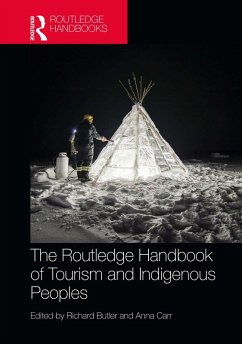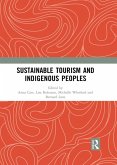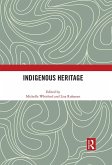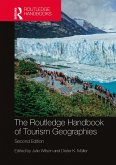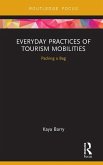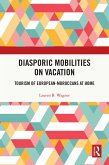The Routledge Handbook of Tourism and Indigenous Peoples (eBook, PDF)
Redaktion: Butler, Richard; Carr, Anna
46,95 €
46,95 €
inkl. MwSt.
Sofort per Download lieferbar

23 °P sammeln
46,95 €
Als Download kaufen

46,95 €
inkl. MwSt.
Sofort per Download lieferbar

23 °P sammeln
Jetzt verschenken
Alle Infos zum eBook verschenken
46,95 €
inkl. MwSt.
Sofort per Download lieferbar
Alle Infos zum eBook verschenken

23 °P sammeln
The Routledge Handbook of Tourism and Indigenous Peoples (eBook, PDF)
Redaktion: Butler, Richard; Carr, Anna
- Format: PDF
- Merkliste
- Auf die Merkliste
- Bewerten Bewerten
- Teilen
- Produkt teilen
- Produkterinnerung
- Produkterinnerung

Bitte loggen Sie sich zunächst in Ihr Kundenkonto ein oder registrieren Sie sich bei
bücher.de, um das eBook-Abo tolino select nutzen zu können.
Hier können Sie sich einloggen
Hier können Sie sich einloggen
Sie sind bereits eingeloggt. Klicken Sie auf 2. tolino select Abo, um fortzufahren.

Bitte loggen Sie sich zunächst in Ihr Kundenkonto ein oder registrieren Sie sich bei bücher.de, um das eBook-Abo tolino select nutzen zu können.
The Routledge Handbook of Tourism and Indigenous Peoples presents an up-to-date, critical and comprehensive overview of established and emerging themes around Indigeneity and connections between Indigenous peoples and tourism development.
- Geräte: PC
- mit Kopierschutz
- eBook Hilfe
Andere Kunden interessierten sich auch für
![The Routledge Handbook of Tourism and Indigenous Peoples (eBook, ePUB) The Routledge Handbook of Tourism and Indigenous Peoples (eBook, ePUB)]() The Routledge Handbook of Tourism and Indigenous Peoples (eBook, ePUB)46,95 €
The Routledge Handbook of Tourism and Indigenous Peoples (eBook, ePUB)46,95 €![Sustainable Tourism and Indigenous Peoples (eBook, PDF) Sustainable Tourism and Indigenous Peoples (eBook, PDF)]() Sustainable Tourism and Indigenous Peoples (eBook, PDF)44,95 €
Sustainable Tourism and Indigenous Peoples (eBook, PDF)44,95 €![Indigenous Heritage (eBook, PDF) Indigenous Heritage (eBook, PDF)]() Indigenous Heritage (eBook, PDF)44,95 €
Indigenous Heritage (eBook, PDF)44,95 €![The Routledge Handbook of Tourism Geographies (eBook, PDF) The Routledge Handbook of Tourism Geographies (eBook, PDF)]() The Routledge Handbook of Tourism Geographies (eBook, PDF)46,95 €
The Routledge Handbook of Tourism Geographies (eBook, PDF)46,95 €![Everyday Practices of Tourism Mobilities (eBook, PDF) Everyday Practices of Tourism Mobilities (eBook, PDF)]() Kaya BarryEveryday Practices of Tourism Mobilities (eBook, PDF)23,95 €
Kaya BarryEveryday Practices of Tourism Mobilities (eBook, PDF)23,95 €![Diasporic Mobilities on Vacation (eBook, PDF) Diasporic Mobilities on Vacation (eBook, PDF)]() Lauren B. WagnerDiasporic Mobilities on Vacation (eBook, PDF)42,95 €
Lauren B. WagnerDiasporic Mobilities on Vacation (eBook, PDF)42,95 €![Japanese Digital Cultural Promotion (eBook, PDF) Japanese Digital Cultural Promotion (eBook, PDF)]() Nadejda GadjevaJapanese Digital Cultural Promotion (eBook, PDF)42,95 €
Nadejda GadjevaJapanese Digital Cultural Promotion (eBook, PDF)42,95 €-
-
-
The Routledge Handbook of Tourism and Indigenous Peoples presents an up-to-date, critical and comprehensive overview of established and emerging themes around Indigeneity and connections between Indigenous peoples and tourism development.
Dieser Download kann aus rechtlichen Gründen nur mit Rechnungsadresse in A, B, BG, CY, CZ, D, DK, EW, E, FIN, F, GR, HR, H, IRL, I, LT, L, LR, M, NL, PL, P, R, S, SLO, SK ausgeliefert werden.
Produktdetails
- Produktdetails
- Verlag: Taylor & Francis eBooks
- Seitenzahl: 496
- Erscheinungstermin: 30. August 2024
- Englisch
- ISBN-13: 9781040086629
- Artikelnr.: 72267448
- Verlag: Taylor & Francis eBooks
- Seitenzahl: 496
- Erscheinungstermin: 30. August 2024
- Englisch
- ISBN-13: 9781040086629
- Artikelnr.: 72267448
- Herstellerkennzeichnung Die Herstellerinformationen sind derzeit nicht verfügbar.
Richard Butler is Emeritus Professor of Tourism at Strathclyde University, Glasgow, Scotland. He has taught at the University of Western Ontario in London, Canada, at the universities of Surrey and Strathclyde in the UK and held visiting professorships in Australia, Austria, Italy, Hong Kong and the Netherlands. Anna Carr (Ng¿puhi, Ngati Ruanui, Ng¿ruahine) is an Associate Professor, co-director of the Centre for Recreation Research and Head of Department at the Department of Tourism, University of Otago, New Zealand.
1. Introduction: Revisiting Tourism and Indigenous People. Section 1. Indigeneity. 2. "Are We Not All Indigenous?" Negotiating Indigenity in Greenlandic Tourism. 3. The Constant Creation of Aboriginality: A Commentary on Indigenous Being and Becoming. 4. A Critical Realist Appraisal of Indigeneity: The Case of Miao Peoples in a Tourism Village in China. 5. Power, Policies, and Cultural Sensitivity in Ainu Tourism: Indigenous Involvement in and Control over Tourism Developments in Hokkaido, Japan. Section 2. Indigenous. 6. Decolonising Indigenous Tourism: Reconciliation, Truth-Telling, Whiteness and "Welcome to Country" in Australia. 7. Learn, Teach, Heal: Indigenous Tourism as a Site for Reclaiming and Becoming. 8. "Come and Know a Little About Your Own Backyard": Transformative Learning Potentials Through Knowledge Sharing in Indigenous Tourism in Australia. 9. Tourism, Truth-telling and Sovereignty: A Gitxaala Perspective. 10. You Can't Ask That! Projective Techniques Unearth Socio-cultural Aversions Towards Indigenous Tourism. 11. An Indigenous Community Code of Conduct for Tourist Behaviours: Voices from the Tibet Autonomous Region, China. 12. Confronting Marginalisation? Gender Dynamics and Batwa Engagement with Tourism in Uganda. Section 3. Indigenous Alternatives. 13. Doing it the 'Pacific Way': Indigenous Education and Training in the Pacific Islands. 14. Stewarding Maori Taonga for Sustainable Indigenous Tourism Enterprise. 15. Indigenizing Tourism by Indigenizing the Landscape: A Digital Marketing Case Study of Wagiman Ethnobiology for Tourism and Conservation. 16. Conversations about Culture: The Need to Integrate Indigenous Voices into the Development of Sustainable Cultural Heritage Tourism Opportunities in the Pacific. 17. Tourism Enterprises in the South Pacific: Culturally Centered Adaptation in the Face of Covid-19. Section 4. Indigenous Knowledge and Rights. 18. The Integration of Indigenous Knowledge in Canadian Protected Areas to Foster Conservation, Reconciliation and Tourism Development. 19. Tourism Appropriation: 'Taking' Land and Culture in Sámi Areas. 20. An Evaluation of the New Ainu Law: Tourism Promotion Policy and Indigenous Rights of the Ainu People in Japan. 21. Indigenous Hosts and Food Security: A Case Study from Simien Mountains National Park. 22. Indigenous Knowledge as an Important Contribution to the Sustainability of Geotourism and Geoparks. 23 Reflexivity on the Establishment of National Parks in the Light of the Chapter by Mason et al. Section 5. Indigenous Tourism Innovations and Developments. 24. Social Innovation in an Indigenous Tourism Development. 26. Pathways To Culturally Sensitive Tourism Policies and Practices. 25. The Upper Navua Conservation Area: Reflections on Ecotourism and Community. 27. Indigenous Handicrafts Based Domestic Tourism in Bangladesh. 28. Indigenous Tourism in Iran. 29. Contemporary Arts and Indigenous Arts-Based Tourism in West Africa. 30. Don't Worry. We Have Your Best Interests at Heart. Section 6. Indigenous Involvement in Planning Development. 31. Indigenous Tourism Association of Canada (ITAC). 32. Indigenous Tourism International Framework, Rights, and Empowerment of Grassroots Organizations: Latin America and the Chilean Case. 33. Development of the Inaugural Queensland First Nations Tourism Action Plan 2020-2025 and the Queensland First Nations Tourism Council. 34. Reflection on Aboriginal Tourism in Western Australia: A Balancing Act of Opportunity and Challenge. 35. Conclusions. Appendix.
1. Introduction: Revisiting Tourism and Indigenous People. Section 1. Indigeneity. 2. "Are We Not All Indigenous?" Negotiating Indigenity in Greenlandic Tourism. 3. The Constant Creation of Aboriginality: A Commentary on Indigenous Being and Becoming. 4. A Critical Realist Appraisal of Indigeneity: The Case of Miao Peoples in a Tourism Village in China. 5. Power, Policies, and Cultural Sensitivity in Ainu Tourism: Indigenous Involvement in and Control over Tourism Developments in Hokkaido, Japan. Section 2. Indigenous. 6. Decolonising Indigenous Tourism: Reconciliation, Truth-Telling, Whiteness and "Welcome to Country" in Australia. 7. Learn, Teach, Heal: Indigenous Tourism as a Site for Reclaiming and Becoming. 8. "Come and Know a Little About Your Own Backyard": Transformative Learning Potentials Through Knowledge Sharing in Indigenous Tourism in Australia. 9. Tourism, Truth-telling and Sovereignty: A Gitxaala Perspective. 10. You Can't Ask That! Projective Techniques Unearth Socio-cultural Aversions Towards Indigenous Tourism. 11. An Indigenous Community Code of Conduct for Tourist Behaviours: Voices from the Tibet Autonomous Region, China. 12. Confronting Marginalisation? Gender Dynamics and Batwa Engagement with Tourism in Uganda. Section 3. Indigenous Alternatives. 13. Doing it the 'Pacific Way': Indigenous Education and Training in the Pacific Islands. 14. Stewarding Maori Taonga for Sustainable Indigenous Tourism Enterprise. 15. Indigenizing Tourism by Indigenizing the Landscape: A Digital Marketing Case Study of Wagiman Ethnobiology for Tourism and Conservation. 16. Conversations about Culture: The Need to Integrate Indigenous Voices into the Development of Sustainable Cultural Heritage Tourism Opportunities in the Pacific. 17. Tourism Enterprises in the South Pacific: Culturally Centered Adaptation in the Face of Covid-19. Section 4. Indigenous Knowledge and Rights. 18. The Integration of Indigenous Knowledge in Canadian Protected Areas to Foster Conservation, Reconciliation and Tourism Development. 19. Tourism Appropriation: 'Taking' Land and Culture in Sámi Areas. 20. An Evaluation of the New Ainu Law: Tourism Promotion Policy and Indigenous Rights of the Ainu People in Japan. 21. Indigenous Hosts and Food Security: A Case Study from Simien Mountains National Park. 22. Indigenous Knowledge as an Important Contribution to the Sustainability of Geotourism and Geoparks. 23 Reflexivity on the Establishment of National Parks in the Light of the Chapter by Mason et al. Section 5. Indigenous Tourism Innovations and Developments. 24. Social Innovation in an Indigenous Tourism Development. 26. Pathways To Culturally Sensitive Tourism Policies and Practices. 25. The Upper Navua Conservation Area: Reflections on Ecotourism and Community. 27. Indigenous Handicrafts Based Domestic Tourism in Bangladesh. 28. Indigenous Tourism in Iran. 29. Contemporary Arts and Indigenous Arts-Based Tourism in West Africa. 30. Don't Worry. We Have Your Best Interests at Heart. Section 6. Indigenous Involvement in Planning Development. 31. Indigenous Tourism Association of Canada (ITAC). 32. Indigenous Tourism International Framework, Rights, and Empowerment of Grassroots Organizations: Latin America and the Chilean Case. 33. Development of the Inaugural Queensland First Nations Tourism Action Plan 2020-2025 and the Queensland First Nations Tourism Council. 34. Reflection on Aboriginal Tourism in Western Australia: A Balancing Act of Opportunity and Challenge. 35. Conclusions. Appendix.
